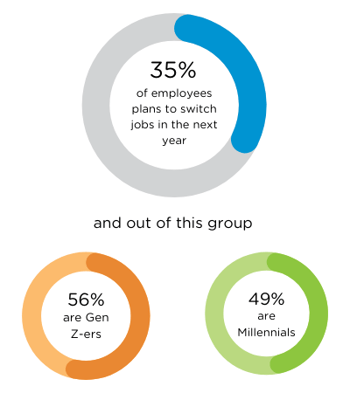The Airswift talent retention white paper is now ready for download
October 12, 2021
- Home
- News

As the pandemic recedes, employees are leaving the workforce in record numbers
It’s been labelled as the Great Resignation. The world is gingerly taking its steps towards recovery, and employees are leaving the workforce in droves. Studies tell us that this phenomenon will not be settling down any time soon. Not unless employers start to make a change.
The US Department of Labour reported that a total of 11.5 million people have quit their jobs during the months of April, May and June, while Gallup Research found that 48% of employees are on the lookout for new opportunities.
A more recent study by Adobe revealed that 35% of employees in countries such as the US, Japan, France, and Australia have admitted to making plans to switch jobs within the next year. These figures were even higher amongst younger employees.
 There are various issues driving this mass exodus. For many employees, the pandemic provided them with an opportunity to not only reflect on and re-assess their work situation, it also put a spotlight on many inequities that exist in the workplace.
There are various issues driving this mass exodus. For many employees, the pandemic provided them with an opportunity to not only reflect on and re-assess their work situation, it also put a spotlight on many inequities that exist in the workplace.
Lack of engagement and employee burnout are serious reasons to consider for the increased rates of resignation as well. A study by Asana conducted across eight countries and 13,000 employees found that 71% of employees had experienced burnout in 2020. Gallup’s State of the Global Workplace Report identified that employees are actively disengaged, with global engagement rates at a mere 20% in 2021.
Other compelling reasons include lack of job security in their current roles, dissatisfaction with employer responses to COVID-19 related business decisions, feeling undervalued by managers, and concerns over personal safety.
The key to employee retention lies in rehabilitating workplace culture and making long-term, sustainable changes that prioritise employee well-being
Instead of searching for short-term solutions to quell the spike in resignations, businesses need to dig deep and make fundamental changes to workplace culture as we know it. According to Arianna Huffington, companies must be at the forefront of encouraging well-being into both work and daily life. She says, “We need to go beyond episodic, ad hoc well-being interventions. We need to stop thinking of recharging as a reward we get for working hard and burning out.”
This can range from encouraging safe and open lines of communication between managers and employees, as well as giving employees more access to mental health and well-being resources.
And employees want to be recognised. They want to feel valued and know that their contributions are making an impact. More than that, they want to be trusted. Business leaders who are able to meet these expectations and take the time to invest in their employees will see greater success in retaining long-term workers.
Greater workplace flexibility is also a major factor in employee retention. According to Bamboo HR:.png?width=472&name=workplace%20flexibility%20(4).png)
Themes in this white paper
In this whitepaper we take an in-depth look at the some of the primary instigators behind employee resignations and collect the input from various industry experts within Airswift to bring our readers a round-up of best practices to elevate their talent retention strategies.
The major themes explored in this white paper include:
- the circumstances that motivate employee resignations
- the criteria for employee retention and engagement
- the challenges of talent retention currently faced by employers
- the long-term strategies to encourage talent retention
About Airswift
Airswift is the global workforce partner of choice for the energy, process, infrastructure, mining and technology sectors. With more than 40 years experience, it provides scalable workforce solutions including consultancy services, global employment and mobility, managed solutions and talent acquisition.
This post was written by: Leanna Seah, Content Marketing Coordinator
You may also be interested in…
-
Recruitment scam targeting candidates via WhatsApp
-
Janette appears on Real Business in Real Time Podcast
-
Nigeria's oil nostrum: what is the petroleum reform hoping to achieve?
-
Airswift ramps up on recruitment with strategic delivery centres
-
James Allen discusses GDPR in Recruitment International
-
Winners at The Global Recruiter Asia Pacific Industry Awards 2018
-
Airswift eyes Chinese renewables market with new country manager
-
Airswift awarded Large Recruitment Company of the Year at RecruitME awards
-
Airswift promotes leadership team to accelerate growth in the EMEA region
-
Airswift named The Energy Recruitment Company of the Year and The Best Large Recruitment Company to Work For at TIARAs

